Did you miss a session from GamesBeat Summit Next 2022? All sessions are now available for viewing in our on-demand library. Click here to start watching.
Some people think the metaverse is going to fizzle. McKinsey thinks that it will grow to a $5 trillion value by 2030. That’s what we call a pretty wide possibility space.
Gaming people are used to this kind of all-or-nothing playing field. We’re going to try to make it easier to see the future opportunities for both gaming and the metavese with our third annual event, GamesBeat Summit: Into the Metaverse 3. It is our latest Metaverse Forum event, dedicated to thought leadership for the open metaverse.
I’m happy to announce we’re going to have a wide variety of speakers at this online-only event taking place February 1-2, 2023. We’ll focus on both traditional gaming and gaming’s metaverse future. We’ll explore the accelerating trend around generative artificial intelligence to the role of brands in the metaverse.

We did our first metaverse conference in January 2021, about eight months before Mark Zuckerberg declared the metaverse was his goal and he was changing his company’s name to Meta. Things haven’t worked out as he foresaw yet, but he is still investing in the metavese. And like many people out there, we only feel we’re at the beginning of a broad and deep change in all of society, not to mention games.
We will carry on with the theme of the crossover of science fiction, technology, and games that we had pursued in our events since 2016. We’ve been inspired by comments like one from Jensen Huang, CEO of Nvidia, who remarked, “We’re living in science fiction.” He was referring to the rapid advances in tech and society because of breakthroughs that enabled deep learning neural networks — or AI that finally worked. That was about eight years ago.
We’ve come a long way from the days of Second Life, when SimCity maker Will Wright said that a “dog-eared copy of Snow Crash is the business plan for every startup in Silicon Valley.” The metaverse seemed to disappear after a while when most of those clones died off, except for Second Life itself.

Yet in the middle of COVID, connected games brought joy back. During the pandemic, we learned it was OK to say that we were not OK. And it became OK to say games helped us cope. The plague destigmatized virtual life.
The concept of the metaverse came back to life during the pandemic because people believed that it would save us from online isolation. It’s clear that we’re in a state again where having a metaverse strategy or Web3 plan is a must. Our event will help survey this landscape of ideas and hone in on the ones that make sense.
Now Huang, A16z’s James Gwertzman, and a whole lot of other people are excited about how generative AI’s rapid acceleration will enable creators to become infinitely more productive and allow them to flesh out their metaverse visions with automatically generated 3D-animated objects. We share that excitement and have asked experts to speak on it like Tom Pigott, CEO of Ludo, which is using generative AI in its toolkit for game developers. We’ll look into the cool trend of putting AI characters into game worlds in a talk with Edward Saatchi, CEO of Fable, the maker of the upcoming AI metaverse The Simulation.

I’m also excited to note that science fiction author, activist, journalist and open source technology advocate Cory Doctorow will be one of our speakers. He is the author of many books, most recently Radicalized and Walkaway, science fiction for adults; Chokepoint Capitalism, nonfiction about monopoly and creative labor markets; In Real Life, a graphic novel; He also wrote Attack Surface, a standalone adult sequel to Little Brother.
We see that gaming’s fate is intertwined with the metaverse, as Meta’s Jason Rubin told us in a previous event. You can’t build the 3D-animated worlds of the metaverse without a game engine, and the people that now how to use game engines are game developers.

Increasingly, those building the industrial metaverse and interactive movies are also using game engines, but the talent is nested in gaming. This race to build the metaverse has its spinoff benefits. People outside of gaming see the value of what it has created, much like 1960s NASA and the space race produced so many spinoff benefits for other industries, from semiconductor chips to Teflon.
We’re looking forward to a fireside chat between Michael Metzger, a partner at Drake Star Partnres, and Chris Cocks, CEO of Hasbro, the famous toymaker that is invested heavily in the digital worlds of games.

To get an international view, we’re tapping Hironao Kunimitsu, CEO of Thirdverse, the Japan-based maker of Web3 and virtual reality games like Altair Breaker and Captain Tsubasa: Rivals, will help us see the view of the metaverse from his unique standpoint. Lisa Cosmas Hanson, president of Niko Partners, will also moderate a panel that gives us a glimpse into the rest of Asia when it comes to the metaverse.
Sheridan Tatsuno, principal of research firm Dreamscape Global, will take us in a new direction by talking about how gaming can simulate climate change in the metaverse.

Resolute Partners’ Ryan McDermott, who help us see the outlook for the economy in 2020, will be back with his latest outlook on where gaming and the macroeconomic trends are intersecting. Ted Schilowitz, futurist at Paramount Pictures, will help sort Hollywood’s vision for the metaverse. And Richard Hoeg of Hoeg Law and creator of Virtual Legality will weigh in on legal and regulatory aspects of the metaverse.

Our own GamesBeat staff — including me, Jordan Fragen, and Rachel Kaser will also be on hand to moderate panels and help us organize some of the most interesting panels that we can. Our topics are also going to cover ethics of the metaverse, women in gaming and the metaverse, diversity topics, the role of blockchain, user-generated content, the real-time metaverse, curbing toxicity and encouraging good behavior, metaverse rollups, investments and M&A trends and more.
How will the metaverse turn out? Will it be dominated by walled gardens or will we see an open metaverse? Maybe we’ll see a constant tug of war, a yin and yang between decentralization and centralization.
Matthew Ball said in the concluding pages of his book, The Metaverse, that trust has never been more important when it comes to the relationship between people and technology. Do we trust our platforms to have our interests at heart?
It is our responsibility as a people to make the metaverse happen in a utopian way, not a dystopian one. We are not all living in a simulation. As Ball said in his book, we have agency.
There is still a bit of time to pitch speakers to us on this link. We are planning to showcase a diverse set of scores of speakers at this event. Sponsors are welcome as well. Cheers, and hope your stay in the metaverse will be awesome.
GamesBeat’s creed when covering the game industry is “where passion meets business.” What does this mean? We want to tell you how the news matters to you — not just as a decision-maker at a game studio, but also as a fan of games. Whether you read our articles, listen to our podcasts, or watch our videos, GamesBeat will help you learn about the industry and enjoy engaging with it. Discover our Briefings.
Read More: news.google.com









 Fact0rn
Fact0rn  Brett (ETH)
Brett (ETH)  ZBIT•BLUE•BITCOIN
ZBIT•BLUE•BITCOIN  U Coin
U Coin  tomiNet
tomiNet  00 Token
00 Token  Silly Dragon
Silly Dragon  BEAM
BEAM  Dogechain
Dogechain  Forward
Forward  Catana
Catana  Interest Compounding ETH Index
Interest Compounding ETH Index  Trust The Process
Trust The Process  Robonomics Network
Robonomics Network  AgriDex
AgriDex  Radiant
Radiant  Dyad
Dyad  Holdcoin
Holdcoin  Stride Staked Osmo
Stride Staked Osmo  X Community
X Community  Neroboss
Neroboss  Solanium
Solanium  Sharpe AI
Sharpe AI  Elonia Trump
Elonia Trump  Fuse
Fuse  Push Protocol
Push Protocol  PIP
PIP  Luminous
Luminous  Chain Games
Chain Games  Epik Prime
Epik Prime  Bitcoin on Base
Bitcoin on Base  MEMENTO•MORI (Runes)
MEMENTO•MORI (Runes)  Ben the Dog
Ben the Dog  ROACORE
ROACORE  FDREAM
FDREAM  Galaxia
Galaxia  Cult DAO
Cult DAO  KCC Bridged USDT (Kucoin Community Chain)
KCC Bridged USDT (Kucoin Community Chain)  TEH EPIK DUCK
TEH EPIK DUCK  BIDZ Coin
BIDZ Coin  Avarik Saga
Avarik Saga  GPU ai Rich
GPU ai Rich  LightLink
LightLink  Koi
Koi  Seal
Seal  Ispolink
Ispolink  EverValue Coin
EverValue Coin  Shark Cat
Shark Cat  Catcoin
Catcoin